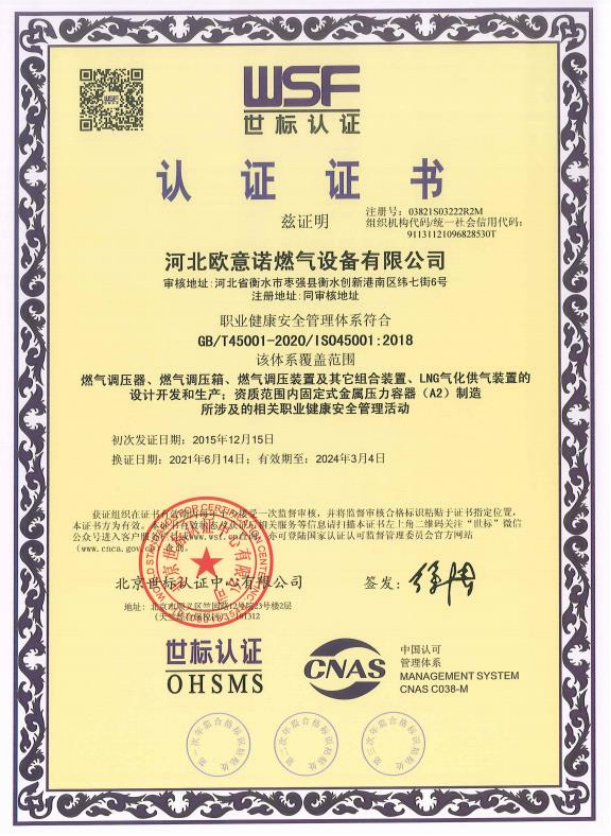
Dec . 05, 2024 02:55
Back to list
Gas Pressure Regulator and Its Importance in Safe Gas Distribution
Understanding Gas Pressure Regulators Essential Components in Gas Systems
Gas pressure regulators are vital devices used in various applications, from domestic appliances to industrial systems. They are engineered to maintain a consistent output pressure regardless of fluctuations in input pressure or downstream demands. This article will delve into the workings, importance, and applications of gas pressure regulators while highlighting their role in ensuring safety and efficiency in gas distribution systems.
What is a Gas Pressure Regulator?
A gas pressure regulator is a mechanical device designed to reduce the pressure of gas from a higher level to a lower, usable level. It adjusts the flow of gas to ensure a steady and safe output pressure, which is critical for the efficient operation of appliances and equipment that utilize gas. Typically, these regulators work by utilizing a diaphragm mechanism that responds to changes in downstream pressure, enabling them to modulate gas flow effectively.
How Does It Work?
The fundamental operation of a gas pressure regulator involves a few key components the inlet and outlet ports, a sensing element (usually a diaphragm), a spring mechanism, and an adjustment screw. When high-pressure gas enters the regulator, the diaphragm moves in response to changes in downstream pressure. If the downstream pressure drops, the diaphragm rises, allowing more gas to flow through. Conversely, if the pressure is too high, the diaphragm moves down, restricting gas flow.
The spring mechanism plays a crucial role in maintaining the desired output pressure. By adjusting the tension of the spring through the adjustment screw, users can set the regulator to deliver a specific output pressure, tailored to the needs of the application.
.
1. Safety One of the primary reasons gas pressure regulators are vital is safety. Regulating gas pressure reduces the risk of explosions or fires caused by over-pressurization. By maintaining stable pressure levels, these devices help prevent leaks and ensure that gas burns efficiently within appliances.
مخفض ضغط الغاز

2. Efficiency In industries, maintaining optimal pressure levels is critical for maximizing efficiency. Gas pressure regulators enable consistent performance of gas-powered equipment and machinery, thus reducing wastage and improving operational efficiency.
3. Versatility Gas pressure regulators come in various types and configurations, which makes them suitable for numerous applications. From residential furnaces, water heaters, and cooking appliances to large industrial settings involving gas turbines, pressure regulators are integral components.
4. Regulatory Compliance Many regions have strict regulations governing gas installations. Properly installed and functioning gas pressure regulators help ensure compliance with these regulations, preventing legal or financial repercussions for businesses and homeowners.
Applications of Gas Pressure Regulators
- Residential Use In homes, gas pressure regulators are commonly used for appliances such as stoves, ovens, and heating systems. They ensure that these appliances receive a consistent supply of gas at the correct pressure, enhancing both performance and safety.
- Commercial Use Restaurants and commercial kitchens heavily rely on gas pressure regulators for efficient cooking operations. Gas grills, burners, and ovens frequently have pressure regulators to ensure optimal cooking temperatures.
- Industrial Applications In manufacturing and processing industries, gas pressure regulators control the pressure of gases used in various processes—such as welding, cutting, and heating—ensuring that equipment operates within specified pressure limits.
Conclusion
Gas pressure regulators are indispensable devices that play a critical role in safely and efficiently managing gas supply systems. Their ability to maintain consistent output pressure not only enhances the performance of gas-powered appliances and equipment but also significantly contributes to overall safety and regulatory compliance. Whether in residential, commercial, or industrial settings, understanding and utilizing gas pressure regulators is essential for effective gas management.
Latest news
-
Safety Valve Spring-Loaded Design Overpressure ProtectionNewsJul.25,2025
-
Precision Voltage Regulator AC5 Accuracy Grade PerformanceNewsJul.25,2025
-
Natural Gas Pressure Regulating Skid Industrial Pipeline ApplicationsNewsJul.25,2025
-
Natural Gas Filter Stainless Steel Mesh Element DesignNewsJul.25,2025
-
Gas Pressure Regulator Valve Direct-Acting Spring-Loaded DesignNewsJul.25,2025
-
Decompression Equipment Multi-Stage Heat Exchange System DesignNewsJul.25,2025

